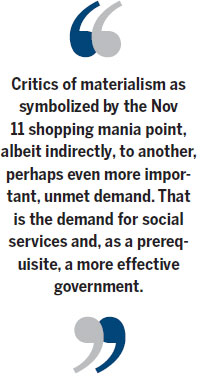Record Singles Day sales hide many lessons
Updated: 2015-11-13 08:12
By Ed Zhang(China Daily Europe)
|
|||||||||||
Shopping spree exposed unmet demand for goods, But focus may shift to unmet demand for social services
Record sales on the so-called Singles Day (Nov 11), a merchants-invented cyber shopping festival for mainly urban young people in China, have been labeled by some critics as 'materialism on steroids' in the world's largest economy of poor people.
Sales were staggering. Tmall.com alone reported some 90 billion yuan (more than $14 billion) in sales.
For economic commentators, Nov 11 packs a lesson. The nation's potential for domestic consumption can be tapped to reinforce growth. People have money. They will spend when they are in the right mood or provided with the right incentives.

In fact, the sales that came from just one day, even though branded as a shopper's big day, are in no comparison with the 1 trillion yuan, and perhaps even more, which Chinese tourists reportedly spent abroad in a year. And remember 1 trillion yuan is close to one-sixtieth of China's GDP in 2014, and would make a hefty chunk of the nation's increment of wealth.
The problem is that while the aggregate number is easy to cite, on a day-to-day basis, China's potential consumer power remains elusive. A few people have pointed out that the potential may fall into three large categories. To wit, demand for novelty, demand for social services, and demand that can be guided and facilitated by the government.
In terms of goods, there is ample evidence that the so-called factory of the world can only meet some of the demand from its own people - much of it of the very basic, often low value-added kind.
It is impossible for the factory of the world to meet its consumers' diverse interests. As officials from the Ministry of Commerce said, if half of the spending by Chinese tourists abroad can be met in China, through bulk import or online delivery, China's imbalance in trade, marked by exports that are far higher than imports, may not look as ugly as it is.
Any increase in imports would be good. Cutting down related red tape and building up the needed regulatory regime are both significant tasks in the country's reform.
But it would be a mistake if one thinks China's unmet demand, from its young urban consumers, is only for novel gadgets and fancy embellishments.
Critics of materialism as symbolized by the Nov 11 shopping mania point, albeit indirectly, to another, perhaps even more important, unmet demand. That is the demand for social services and, as a prerequisite, a more effective government.

The agrarian heartlands and vast frontier regions of the country still have a lack of many social services and basic commercial standards. Local schools and clinics are dilapidated and poorly equipped. Village stores are stuffed with goods of fake brands and inferior quality, if not poisonous materials.
Such a phenomenon's existence is a downright embarrassment to a government that claims to be serious about rule of law - if it could only deliver social services and enforce commodity standards in the large cities.
In this regard, the e-commerce companies' user-generated rating and review system for online suppliers' goods and services is a much more valuable contribution to China's progress than their celebrated one-day sales records. The central government's recent decision to facilitate e-commerce companies' expansion to the rural delivery system can be part of a solution to boost consumer rights in central and western China.
The third category of China's unmet demand is of a seemingly non-existent nature. But it can be created with a change in policy. This is not a joke. One can see such government-invented demand wherever the regulatory regime leans towards a new preference.
One famous Chinese example is its policy changes on family size. They have had a huge impact on the economy, and will continue to do so.
Another example, on a relatively micro-level, is the rise in auto sales, thanks in part to a decision by the State Council, the country's cabinet, in September to grant a sales tax cut for cars with a 1.6-litre or smaller engine.
In October, China produced a total of 2.19 million autos, and sold 2.22 million autos, up nearly 12 percent year-on-year.
Meantime, according to the China Association of Automobile Manufacturers, the number of electric autos shot up as much as 900 percent, mainly because of the policy leniencies the car owners can enjoy.
The author is editor-at-large of China Daily. Contact the writer at edzhang@chinadaily.com.cn
(China Daily European Weekly 11/13/2015 page13)
Today's Top News
China's migrant population expected to reach 291m by 2020
China sends more currency overseas to meet demand
Little Chinese speakers hatch in UK's first bilingual nursery
China mourns death of former German chancellor
Former envoy recalls 'China hand' Helmut Schmidt
Alibaba breaks sales record on Nov 11 shopping spree
Britain's Cameron appeals to EU reform doubters
October inflation eases to 1.3%, producer prices fall again
Hot Topics
Lunar probe , China growth forecasts, Emission rules get tougher, China seen through 'colored lens', International board,
Editor's Picks

|

|

|

|

|

|






